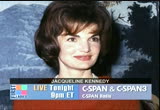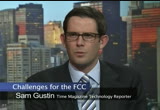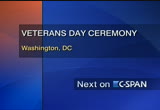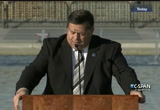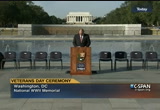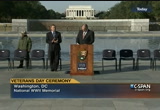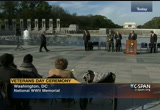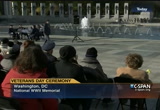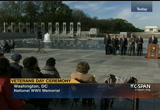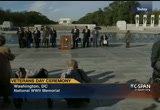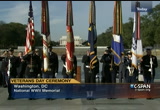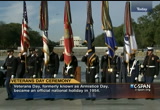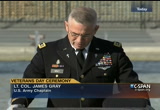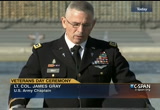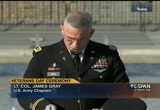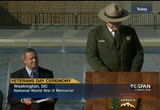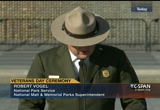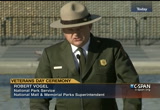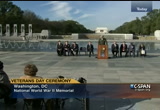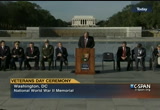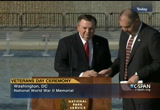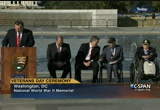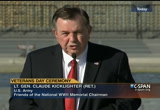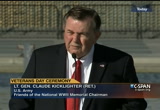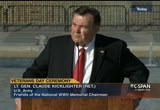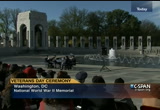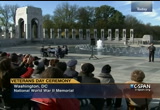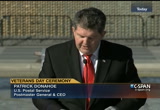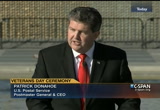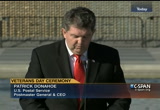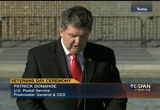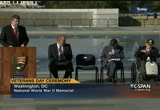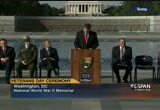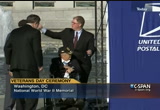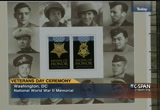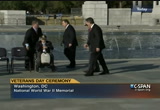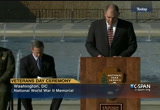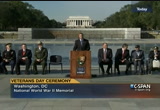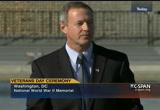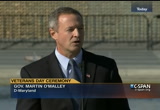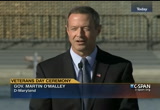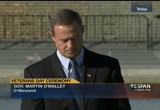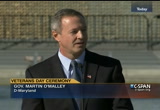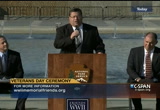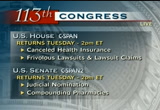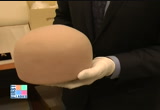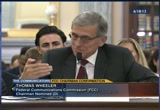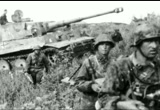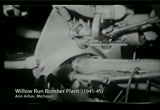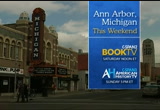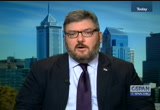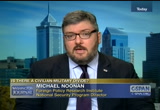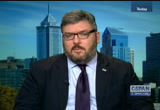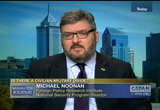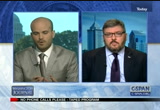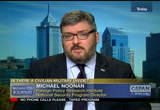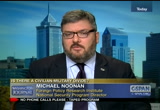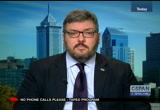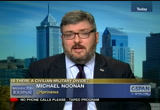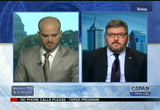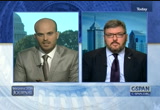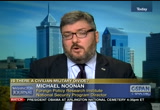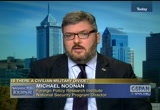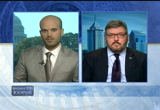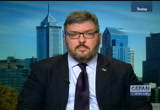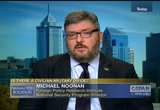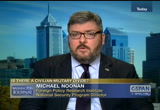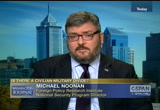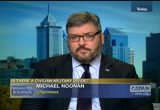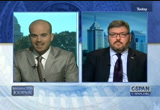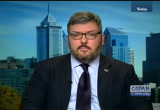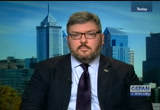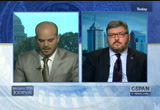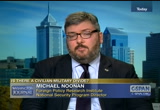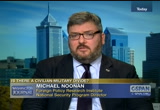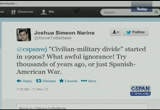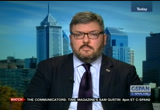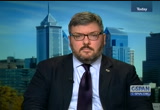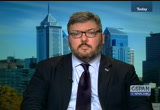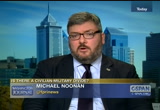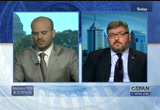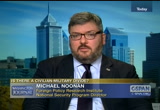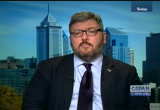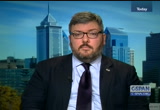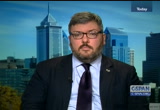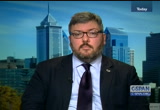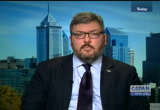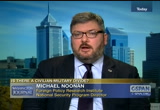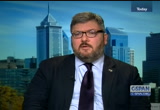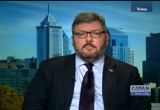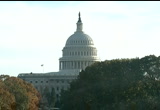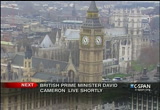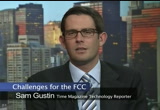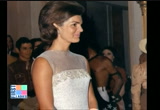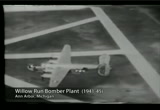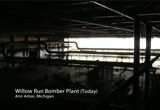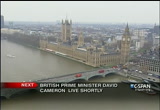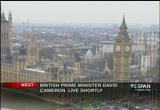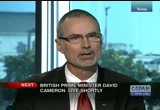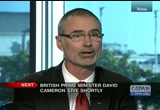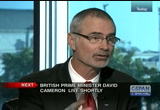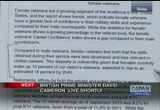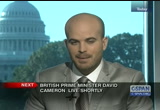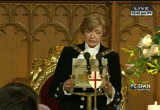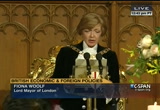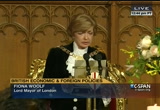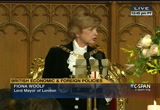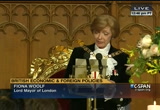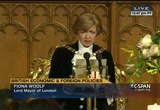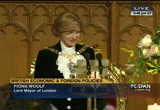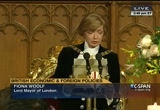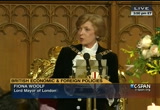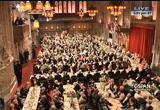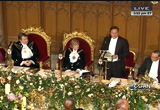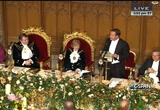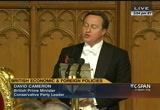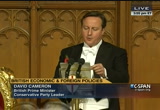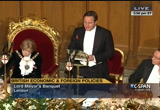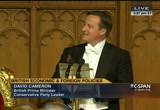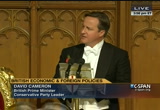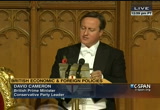tv Key Capitol Hill Hearings CSPAN November 11, 2013 2:00pm-4:01pm EST
2:00 pm
2:03 pm
2:04 pm
their service to our country. and you all for being here today. a special thanks to veterans for your service and sacrifices for our nation. i am pleased to introduce the official party for today's commemoration. firstly, the governor of the great state of maryland, the honorable martin o'malley. also with us today is the postmaster general of the united states post office, the honorable patrick donahoe. the superintendent of the national mall and immortal parks
2:05 pm
, mr. robert mobile. the executive director of the maritime administration, mr. joule is a bot. -- mr. joel zabat. and my boss, the chairman of the board for friends of the national world war ii memorial, lieutenant general -- army states -- united states army retired. also with us today, we have from the military district of washington, james gray.
2:06 pm
2:07 pm
2:08 pm
inouye, or presenting her husband, senator daniel in no way -- representing her husband senator daniel inouye. thank you for being here to commemorate the special day at the world war ii memorial. please rise for the presentation of the colors and the playing of the national anthem and the indication. -- and the invocation.
2:11 pm
>> release -- please join me in the prayer according to your faith. heavenly father, your words strikes us. be strong and let us fight bravely for our people in the cities of our god. dear lord, on this veterans day we take time to remember our veterans but particularly our world war ii veterans. lord, our congress in 1926 established that this would be a day to honor our veterans for their patriotism, love for our country, and willingness to serve and sacrifice for the common good.
2:12 pm
for us to take solemn pride in the heroism of those that died in the country's service. the state to be commemorated with things giving, prayer, and exercises designed to promote goodwell. therefore, oh lord, we begin the ceremony with prayer, thanking you for the less things of peace in our land by the sacrifices and services of our fellow citizens. we thank you for those who stepped to the shores of eternity and for those that still bless us today with their presence. particularly during this, that during this time our nation, who understands the ravages of hurricane, our hearts go out to the fellow friends and in nation of the philippines. world war ii veterans served and
2:13 pm
liberated their country. so many citizens called that home their first land. lord, we pray for our veterans many of those who are even now reaching out to them. today we pray that we never would beget the examples of our world war ii veterans. the citizens served -- they truly understood duty, honor. we will not take for granted. your word says blessed are the peacemakers for they will be called the children of god. we ask for your blessing on the peacemakers of this board to. may we be like them, a people of peace. in the blessed name above every name's, to offer our troubles to offer wisdom for our trials, who desire to bless our nation that we acknowledge -- according to our faiths we pray. amen.
2:14 pm
>> it is my privilege to introduce the superintendent of the national mall and memorial parks. mr. robert fogel. >> good morning on behalf of the national mall and memorial parks and national park service, welcome to this annual observance of veterans day at the world war ii memorial. i am very pleased to welcome governor o'malley. we look forward to hearing your inspirational word area --. i am -- your inspirational word. as always, it is a pleasure to be here with my good friend general kicklighter, who is
2:15 pm
friends with the world war ii memorial. we very much appreciate the ongoing support that the friends provides the memorial. just this past week, -- a world war ii memorial app. if you have not seen it, take a look. and welcome to all of our veterans and a very special welcome to our medal of honor recipients. senator in a way was a key figure -- senator inouye was a key figure in making this a reality. thank you so much for your service. 70 years ago, in the midst of
2:16 pm
two great wars on opposite sides of the globe, 9 million servicemen were on active duty. that number swelled to over 12 million by the wars ended in 1945 read millions more work in americans. toiling with the convention that each rivet fastened would help their uniformed servicemen and women win the war. to end tyranny and to restore freedom and democracy around the world. through courage determination and selflessness, they succeeded in that mission. when they came home for the war veterans work was not done. our veterans improved education
2:17 pm
with the g.i. bill of rights. they built our nation into a land of prosperity or security. winning the war was only the beginning. building a better america is their lasting legacy. this memorial is an enduring reminder of our world war ii veteran's service and sacrifice. it brings people together to honor our veterans and to reflect on their legacy. this memorial of stone and bronze has the power to rekindle the flame of affection in our hearts for all who served, for all who answered the call of duty, and defended our nation in one of our darkest hours. to all of our veterans, i am humbled to join with you in the
2:18 pm
ceremony, honoring your service to our nation. thank you for attending today's events and welcome to your memorial. thank you very much. [applause] >> i would like to take a minute to read a poem by mr. thomas crane, who recently visited the memorial here. it is titled "in honor of the world war ii veterans and memorial." "fallen heroes lie beneath the soil of many foreign lands where rows of markers make their stand. a monument erected to bring the memories close at hand, many a buddy died.
2:19 pm
now he lives with such a great sorrow. a vet remembers when pals stood at his side. he carried a vision of them that he can never hide. the hell, the horror that they all had faced he knows within his heart they will not be forgotten or disgraced. though old and weathered the memories bring tears to his eyes as he slips through the years of stocks of their comrades bring images so near. it is now my honor to introduce the chairman of the board for friends of the national world war ii memorial, lieutenant general -- m on behalf of friends of the national world war ii memorial, it is a great honor and
2:20 pm
privilege to welcome you this morning. general o'malley and postmaster donahoe, thank you so much for being here and making the ceremony so special. it is extremely special to have for congressional medal of honor recipients attend this ceremony. thank you all for being with us. we have so many other distinguished guests this morning and we especially have our honored guests. our world war ii veterans and their families. other veterans and their families and the men and women who are currently serving in our armed forces, ladies and gentlemen thank you so much for
2:21 pm
coming and to honor the men and women who served and sacrificed to keep this great nation strong and free. at this very special memorial, we especially remember the 16 million americans who served during world war ii and all those who served on the homefront. we want to honor our world war ii veterans who fought the most destructive war in history. more than 60 million people lost their lives in that war, mostly men and women and children and the elderly. they not only fought that war against great odds, but they won that war. they not only saved this nation but they literally saved the world. we also were member those who served on the homefront. never has our nation been so united as they were in that war.
2:22 pm
we especially remember the 400,000 americans who never came home. they give all of their tomorrow's. when they were only 18 or 19 years old, all of your tomorrows is a high price to pay. they paid that price so that we could live in this strong, free and beautiful america that we are proud to come home. the board and staff of the national world war ii memorial is privileged to continue to work very hard to ensure the legacy, the lessons, and the sacrifice of the world war ii generation is never forgotten. it is also great pride to work alongside the park service who did such an outstanding job in taking care of this magnificent memorial. we are also proud to partner
2:23 pm
with the national park service and the department of defense to help cohost special commemorative events like this one today. thank you for coming and honoring and remembering the veterans for their service valor, and sacrifice that kept this nation free throughout our history. also i would like to give a special thanks of remembrance to the men and women who are serving in our armed forces today. for coming off the paddle fields of a rock on afghanistan. -- the battlefields of iraq and afghanistan. god bless all of our veterans especially our world war ii veterans. god bless the men and women who are serving on our battlefields. god bless america. thank you so much for being here. [applause]
2:25 pm
2:26 pm
dedication. we are honored to have with us the postmaster general of the united states post service, the honorable patrick donahoe. >> thank you and good morning, everybody. the postal service is proud to join this salute to our country's veterans. i would like to recognize some special guests here today. ms. irene inouye, colonel buckley, the father of one of our postal inspectors antonio -- who designed the stamps we will see in a couple of minutes robert fraser, who is a photographer whose image appears
2:27 pm
on the stamp -- from the postal service is citizens stamp advisory committee. this memorial is a place to honor heroes. it is where we come to pay tribute to veterans who have sacrificed so much to defend our country and the freedoms we cherish. the postal service also has a role in honoring american heroes. that is through stamps. many stamps tell the story of people who have shaped our history and defined our heritage. today we are dedicating stamps that salute recipients of the medal of honor our nation's most prestigious military decoration. it is awarded by the president to service members who go above and beyond the call of duty.
2:28 pm
this is an award like no other of the 16 million americans who served our country in world war ii only 464 received the medal of honor and more than half were warded posthumously to men and women killed in action. throughout world war ii there were two versions of the medical on -- the medal of honor. one for the army and one for the navy. today we are dedicating to stamps, one that features the picture of the army medal, and one that says the navy first. when we announced the stamps we wanted to do something special. we decided the stamps should come with a list of all 460 four -- 464 medal of honor winners from world war ii along with the images of the 12 living recipients.
2:29 pm
sadly we have lost four of these men. had the good fortune to know senator daniel in a way -- senator daniel inouye. he destroyed two machine guns and an candidates with hand grenades. his right arm was shattered. he refused evacuation. he continued to direct his platoon until the enemy was defeated. our pitchers remain as part of the stamp folio, along with the images of two recipients who were honoring with us -- honoring us with their presence. let me tell you about his story. october 1944 while fighting the enemy in france he positioned his machine gun in front of the enemy and began to absorb their
2:30 pm
attacks. during more than five hours of combat, he would've 58 soldiers and saved the rest of his company. the other medal of honor recipient is george the cotto who happens to be a retired member of the postal service. in 1944, october, his unit was pinned down by heavy enemy fire. he launched a one-man rush that inspired the platoon to charge and destroy the enemy. the result, he killed 12, wounded two, and personally captured for enemy soldiers. i would like to ask mr. ross and mr. staccato to stand or waif right now so we can salute their courage. >> thank you for being here.
2:31 pm
you can learn a lot more about mr. ross and the other world war ii medal of honor recipients by visiting the official website. i also want to take the opportunity to point out another postal service retiree, anthony gizzi. vicki for being here today. indeed our challenge as a nation is to never forget the sacrifices of all the men and women made on our behalf. that is why we have veterans day, memorial events like this one. we help this new medal of honor stamp will get everyone more ways to preserve our stories for future generations. please use the stamps, send them around the country, and around the world. let them serve as small reminders of the giant sacrifices made by the men you see here today, the heroes of world war ii. thank you very much.
2:32 pm
2:35 pm
>> the honorable martin o'malley is serving the people of maryland and his second term as governor. a former governing magazine public official of the year, governor o'malley, was reelected . his 2013 legislative successes were described in a baltimore sun editorial as without many parallels in recent maryland history. governor o'malley served where he was recognized by esquire magazine as the best young mayor in the country. by time magazine as one of the them top five big-city mayors.
2:36 pm
between 1999 and 2009 his policies helped the people of baltimore writ -- a baltimore achieved the greatest crime reduction of any of america's cities. the late thomas martin o'malley served with the u.s. air force during world war ii. it is my privilege to introduce the great american, donor martin o'malley. >> thank you very much. postmaster general donahue, to mrs. inouye a, to george the cotto, will -- to george staccato to john minnick and the distinguished company of
2:37 pm
veterans from baltimore city, the greatest city in america. to veterans one and all. the spirit of my father. 72 years ago, my parents generation found our nation plunged into world war. theirs was a clear and epic struggle. a struggle that would determine whether or not this government of the people, by the people, and for the people would perish from the earth. here today at the world war ii memorial, encircled by granite stones of american honor, we pause this morning as one nation to pay tribute to our veterans.
2:38 pm
here the fanfare of the common man. citizen, soldier american brother, son each was asked a question in the snows of korea or the jungles of vietnam, in the deserts of iraq, or the mountains of afghanistan. in the pledge drench us the blood drenched feels of gettysburg or the frozen mud of valley forge each was asked a question. for family or neighbors, for generations you will never meet for one nation under god, how
2:39 pm
big is your love. our duty this morning is not to lift their service hire, no personal tribute or feeling of hours, no filibuster or shut down can touch the gift already sending far beyond our earthly reach. our duty has -- is not to lift higher but to dig deeper, to search through the shadows of our own current outs, to rediscover our own true selves. to find within us the power greater than the individuals we are. to seek or touch a stronger truth, a truth to heal the heart of our democracy. a truth that still abides, a
2:40 pm
truth that calls us to their unfinished work. our parents and grandparents the essence we share as americans. it is the truth that lies at the heart of the american dream. the more she gives to us, the more she gives to our children the more she gives to our grandchildren. the veterans weise -- we honor today did not serve, did not fight and die, so their children could grow up in a country of less. he gave to us a larger and stronger country. a country of more, a country of more opportunity.
2:41 pm
more freedom, more justice. a country we now have the ability to pass onto our own grandchildren, if we choose even stronger and better than they gave her to us. the future that created was far larger than themselves and even their own generation. the love they freely gave us was an everlasting love, expansive, resounding, and big. and so it was to be with us. with the ongoing life is not finished. the duty to preserve, protect and defend is not the exclusive
2:42 pm
fate or franchise of anyone generation, however great. it is the freedom of every generation. it is the responsibility of every generation. it is the greatness that calls to each of us. may god bless the souls of all brave men and women past, present, and future, whose love for others proves them were in the -- proves them worthy to be called americans. [applause] >> thank you, governor. at this time, we will now present and prepare for the wreathlaying ceremonies. these remained seated.
2:43 pm
we will have the united states air force band perform for us. >> on this veterans day, president obama maintained the tradition of placing a wreath at the tomb of the unknown at arlington national ceremonial -- arlington national cemetery. he made remarks to the audience paying tribute to his members whose family members lost their lives in service to our country great coming up in 45 minutes we will show you a speech by david cameron, he spoke to an audience at the lord mayor's bank earlier today with guests from the financial and diplomatic sectors of london. that is coming up at 330 eastern. both the house and senate will be back tomorrow at 2 p.m. eastern. the bill allows insurance companies to continue offering policies, even if they don't meet minimum coverage requirements.
2:44 pm
the house will also vote this week on requiring federal judges to pose monetary penalties or minimum coverage even if they don't meet requirements. the house will also vote to impose monetary penalties for frivolous lawsuits and requiring cost checks. the senate will vote on a nomination. the houses live on c-span. the senate on c-span two. >> mrs. kennedy is known as a style icon. she put an awful lot of thought into her wardrobe when she was representing the country both at the white house and while traveling abroad. she would think about what colors would mean something to the country. for her visit to canada, she chose this as a gesture of
2:45 pm
respect for the red of the canadian maple leaf. she also knew the advantage that she was going to color or a standout. >> live on c-span and c-span three, also on c-span radio and c-span.org. >> i have spent a lot of time dealing with the fcc in my life. it is important that the agency makes decisions in a timely mashup -- timely fashion. there's nothing worse for investment, innovation, job creation all the things that flow for investment, then businesses not knowing what the rules are.
2:46 pm
>> with a slow-moving agency like this that the brits for months, even years on end, it really does create uncertainty. business needs certainty to be able to invest. if there's one thing we need in the united states, in terms of broadband and communication infrastructure, we need investment with dispatch. >> sam guston on the challenges ahead for the new fcc chair, tom wheeler. >> with the war in europe turning hot, the u.s. was totally unprepared and chief of staff of the army came to president roosevelt and said we cannot do things we have done in the past.
2:47 pm
we have to act now, we have to act decisively, and we have to do it today. roosevelt went to congress the next week and said the u.s. must built that must build 50,000 airplanes to protect itself and all of the auto companies were given projects to build engines and airplane parts and the ford motor company was given the be 20 bomber, which was a problematic airplane. it was still in development stages. they wanted to mass produce this airplane. ford said i am not just going to build parts, i will build complete airplanes. they took what had been done as individual pieces and took the engineering drawing and assigned it to hold within to thousands of us -- of an inch. these pages would go on to the assembly line and this for the unskilled assembly workers.
2:48 pm
35% of the bombers built in the united states were delivered and that was one of 11 factories building the bomber. saving a little piece of this plant was so important to that story. it is beyond words. i cannot describe the feeling we all have and the big smiles once we pull this off. we did something here that was not done anywhere else in the world and it literally saved the world from axis powers. we did that right here. >> yankee air museum is currently trying to save part of the willow run plant and plans to turn it into their new home. find out more next weekend at the tv and american history tv. saturday at noon on c-span two and sunday at 5 p.m.. >> coming up alive, a speech by
2:49 pm
david cameron. until then, a discussion on bridging the civil limb -- the civil military divide. looks on this veterans day we are going to take a look at the ways the u.s. civilians and their military are starting to drift apart. it is a topic that often refers to as the civilian military divide. joining us to discuss this issue is michael noonan, a veteran of operation iraqi freedom. what are some of the ways the civilian military divide manifests itself so that people can see what we are talking about here? >> first of all we have to know there is going to be some form of civil military divide. when people join the military they are enculturated to the way the military does things, being
2:50 pm
able to do orders and things most normal people would not do. there is always going to be some form of divide between the military and civil society. there are ways that kind of exasperated -- exacerbate those risks, particularly postal service. in yesterday's washington post they talked about the military divide and how the military actually contributes to it by things like living on big bases that have been closed into the public. they have their own school system. they are gated communities basically. and among some -- because we do have an all voluntary military there is a feeling among some that perhaps they are better than the civilian society that they defend, so those are just
2:51 pm
sort of some of the manifestations of the civil- military divide. host: when did this start? when did people like yourself by writing about this and talking more about it? guest: it started in the 1990s really. there were two studies came up. one, a consortium between duke university and the university of north carolina chapel hill and north carolina state, and the center for strategic and international studies did a big study around 97 or 1998 talking about the culture and what differentiated the views and attitudes of the sort of civil- military divide.
2:52 pm
some people thought it was kind of a byproduct of the clinton administration, how you had a president who chose not to serve in vietnam and peoplesoft is perhaps as a partisan issue and were looking at things like political identification -- people saw this perhaps as a partisan issue. at the time it skewed heavily conservative -- not necessarily republican but a more conservative worldview than civil society. some people thought that this was going to change when president george w. bush took office, but it really didn't. as we saw with the iraqi and afghanistan wars, certain segments of the military itself found certain aspects of these wars to be kind of unpopular. so it is really sort of a post- cold war manifestation tied up with -- since the end of the draft, you move to an all volunteer force. certain people feel that sense of volunteered, they are serving on behalf of society and certain segments have felt some time to time that they are sort of
2:53 pm
unappreciated. host: we are talking about the civil-military divide with michael noonan from the -- policy research institute. we want to hear your thoughts. with a special line, again, for veterans on the subject. we want to hear from you on this veterans day. 202-585-3883. all others -- host: mr. noonan, while folk are calling, talk about the technology. some people who have written about the subject have said technology has further widened the gap. guest: i think it has both the widened and narrowed the gap. for instance, when i was in iraq, i had access to e-mail and
2:54 pm
i lived in a small fort with the iraqi army and one of the units before is installed a commercial internet line. so, i got literally come back from a patrol going out with our iraqi battalion an e-mail or call my wife on the phone, which previous generations did not have the opportunity to do. it was kind of instant communication. i think that could be both a blessing and a curse sometimes because it could take away some of the distance there. in one sense, it kind of connection you but in the other sense, if he had a bad day it is really not that great to have instantaneous access to people. and when you drone operators working in a place like the air force base in nevada, actually conducting end of combat operations using remotely piloted aircraft. and they can take out military targets on the ground and then
2:55 pm
kind of go home and go to soccer practice for the kids and have dinner that night. so that is kind of that -- some people degrade their service but on the other hand, it is kind of an unenviable position for them to be in. host: michael noonan from the foreign policy research institute. served in iraq in 2006-2007. correct? and where did you serve? guest: in western ninevah province, up in the northwest corner of the country not far from syria. it was an interesting part of a rack. heavily kurdish, turk -- interesting part of iraq. sunni arab -- but there were a lot of foreign fighters coming from syria causing a lot of problems.
2:56 pm
a very interesting and unique place to serve. i am sorry, go ahead. no, i was about to say we were actually able to go back into the kurdish part of the country. that really is the otheriraq. much different than serving down in baghdad but in our area of operations where we were stationed you certainly would not go out like that. host: michael noonan with your questions and comments. mary from fort washington on our line for democrats. good morning. caller: good morning. thank you for taking this call. i am and ask military brat from the 1960s in the 1970s. i was a military brat until i was 22. i think the civilian-military divide is far less today than it was back in those age. we do live very sheltered. when you are in the military you have the best px, the post exchange, the store, for laymen. still today, if you want to go
2:57 pm
to a real grocery store you go to a military base. because of the wars, extra divide in that sense. civilian armada -- are not allowed to go on the military base as they used to, so they are going to feel that divide. but as far as emotional divide i feel that military families are more open-minded because you have more access to the world. so, we try to close that divide as often as we can but every time we have a war, we shut down and closed the gates down, a get wider and it is back and forth. my opinion. thank you.
2:58 pm
host: michael noonan? your thoughts. guest: your caller makes excellent points. my generation of veterans experienced nothing like the people who served in vietnam and came back and were kind of really treated poorly by society. even a society that has the troubles with the post-9/11 wars at least thankfully have made that the tension that the people that serve are not responsible for serving there, that there is kind of this divide between politics and the soldiers. i think that is a great thing. on the other hand, i think it is almost too much sometimes. when i came back from leave from iraq, it was hartsfield airport in atlanta and just eruptions of applause, not a plane -- coming off the airplane made you feel self conference and there is a difference and awe sometimes that makes many veterans of my current generation of little bit uncomfortable. host: you brought up the "washington post" piece from yesterday on the issue. who is responsible for this divide? that piece points out the u.s. military, the way that they howl as active-duty members of the military could be part of
2:59 pm
the problem here. it notes that u.s. military bases are some of the most exclusive gated communities. more than a third live on base as with many more living just outside the wire -- host: michael noonan, who do you think is sort of more at fault in creating a sort of divide? = between civilians and the military? or is one side more at fault? guest: on that issue, certainly post-9/11, there was a feeling and a justified one, that there was an increased threat to military bases.
3:00 pm
so, some of the family housing areas are not the traditional -- areas.they are not as restricted on certain dates as they are in certain places so on one hand, yes, there is probably a good reason to lock down some of those bases those in bosnia and others who have come to the states and were talking about carrying out an attack on fort dix, so there was chatter that said that these places might be prone to attack. however, we probably took it too far, and we might want to think about starting to kind of fallback on some of that. one of the biggest problems is the military, particularly the army, has these big mega bases
3:01 pm
in these not traditionally big urban, heavily populated areas and there is some rationale to that. we have to have access to ranges and training and things like that, and the cost of living and other expenses that you would have to pay if, for example, in brooklyn or something if you are going to put a lot of active-duty troops there so the services have factored in some of these costs. that is not to say that there is maybe a call to sort of put some of these active-duty places in the northeast and other places, and in the northeast right now there is really only one big military base up in northern, northern new york, and there is not a lot of contact with active-duty military people. on the other hand, there are guard and reserve units all over the place. the big armory, and it does show
3:02 pm
sort of a military face to the public but it is not as much. >> and in that topic, in thinking about a future geographic footprint, the military should try to locate bases closer to population centers, and it should be balanced against the value of close relations between the military and society. on twitter writing in on this subject, the military lives with sacrifice daily, whereas many others today expect things given to them for free. we are taking your tweets and call us. john is up next from new mexico on our line for democrats. john, good morning. caller: good morning. happy veterans day. for all you guys have done for
3:03 pm
the country, i want to thank you for that. there is a political divide, but it is not with the military. it is the growing wealth divide between the rich and the poor. out here in new mexico, there are people that we know, and there really is no divide between the civilians and others because we have them around, and we are thankful for them. with the political divide, what has happened since world war ii, it shows us the truth is in there somewhere, but there is a lot of gray area. we blame the politicians mostly because we do not feel like, the people do not feel like we were the good rise in these wars. thank you. host: michael noonan.
3:04 pm
guest: yes. yes, there is -- host: is economics contributing to this divide? guest: economics? i would not say so. when you are on active duty, the pay is not particularly bad, you know, with allowances and other things. i guess the caller is down near and around fort bliss, so there is kind of a heavy military presence in new mexico, and that kind of aligns with what was talked about yesterday, this kind of open space. yes, i would not want to speculate about the socio- lyrical kind of argument that the caller was talking about. host: let's talk about how we
3:05 pm
fix that divide. what are your suggestions for narrowing the divide? guest: i wrote a piece back near memorial day, with "u.s. news and world report," and there is a conflation of things, like veterans day today, which is supposed to be a celebration of veterans for their service and patriotism and their sacrifices. and memorial day which is about those who have made the ultimate sacrifice, and they are very different days. if you have known anybody who has passed away, memorial day is a very somber event. it is not about going out to the beach for the weekend. so there are a few ways that you can narrow this gap a bit.
3:06 pm
one of them would be for the military and others to accept that there are other points of service out there. things like teachers and municipal workers and others, who are actually serving their communities. in certain cases, the police and firemen do, but we need to expand the concept of service and we need to accept that not everybody needs to be in the military. less than one percent of the population has served in these wars in iraq and afghanistan and other places around the world since 9/11. and i think the number was put at about two point 6 million people out of a population of over three hundred million people, so it is a very small percentage of the people, and we do accept that, yes, when we volunteer, service is about
3:07 pm
serving. it is not just about a lifetime of benefits afterwards. fellow veterans who have been injured, both physically and mentally obviously, the government needs to keep faith with those that rims and make whole the promises that they promised them, but on the other hand, veterans also have an obligation. there was a very interesting piece yesterday that went up, talking about the experience of a combat infantryman, a student at georgetown university, and he talks about how for the first few years going to school there, he sort of had his chip on his shoulder up being a veteran, and then he came to a realization that he will have it both easier and harder in a sense than some of his former classmates who have not served, and the second
3:08 pm
world war generation and others, when they came back from their service, it was one part of their lives not something that needed to define the rest of their lives, and they went out and did things in their community. there are other forms of service. i think there are some organizations today, the mission continues and others, that really tried to bridge the divide by working with civic and business organizations around the country. tapping into some of these experiences, and other things, to make their communities better places to be in and to continue to serve. host: michael noonan from the policy institute, we are talking about the divide, and we are taking your calls. from eau claire, wisconsin thanks for calling in. caller: i am a veteran who
3:09 pm
served in both afghanistan and iraq, and i stand in solidarity with those who are demanding an investigation. why are you not looking at the evidence about nine/11. host: we are topping -- talking about the divide. do you have a question on that topic? thank you for calling. we have another caller. caller: i thank him for his service. the thing that concerns me very much today, every single day, 52 american veterans commit suicide
3:10 pm
. we had four presidents. dwight eisenhower warned about the military complex. presidents eisenhower, kennedy ford. they all served in world war ii. these men had a tremendous appreciation of veterans, and kennedy, eisenhower, in gerald ford would not commit troops. george w. bush went into iraq and came out. mr. eisenhower warned about the military industrial complex.
3:11 pm
eisenhower and george bush to you, they gave in. i have had four of my friends commit suicide over neglect of veterans. i reported to my congressman about the abuse. as a result of these honorable men and services that were being abused -- i did something that should not have been done. host: the experience of actually going to war, and u.s. leaders and the pew research center put out a recent survey on veterans in congress that talks about this issue and talks about the shrinking number of veterans in
3:12 pm
congress, down to about 20% today in both the house and the senate. does that contribute to the civil-military divide here? guest: first, i would like to thank robert for his service in vietnam, and i would like to say that the issue he raised about suicide is a very, very important one today. people will need to step up their game to help those coming back particularly those who have had mental scars from the service. on the issue of veterans in congress, i think that is perhaps one of it. obviously much fewer than the past. however, remember, in the past, some of these people served -- we had the only period of keys time constriction from the end of the korean war until 1964,
3:13 pm
1965, whenever you want to count the beginning of the vietnam war, so there were a lot of people who had served and served in congress, so putting that up as a metric i think would be kind of one way of perhaps exacerbating the civil-military divide, and it would disproportionately represent veterans in politics. i do not think that there is any negative stain of veteran serving but people need to be careful of sending a message that somehow people that serve in uniform are somehow better than their fellow citizens serving in congress. now, that being said, yes obviously, some things need to be happening. i am starting to hear about robert's experience at the v.a. but there are some issues at the v.a. that really need to be fixed, and we need to provide better service to veterans of
3:14 pm
all conflicts not just our most recent veterans. host: an veteran mental health issues is an important subject we will get to a little bit later on the show. we have another guest on, coming up later on the show at about 8:45. we are talking about the civil- military divide with michael noo na. he has written on this. talking about the history of the civil-military divide, he said it started in the 1990's. or just the spanish american war. does it go back farther in u.s. history, mr. noonan? guest: i did not say it went
3:15 pm
back just to the 1990s but as my opening comments say, there will always be some kind of divide, and i think it gets exacerbated. there are things like the draft riots in new york. it has always been around. they are talking about guardians , people that they protect. there is always this kind of divide and the conflicts usually tend to exacerbate that rift or particularly contentious periods in politics. host: from oregon, a veteran on our line for democrats. good morning. caller: good morning, and i would just like to say to all veterans, let's have a happy day and thank all of the veterans we have served with. let's try to keep the conversation civil. i am a civil engineer.
3:16 pm
i have been around the world had a great time. this was 1978 to 1985 active, in the reserves from about 1985 to about 90. never fired a shot in anger but spent all kinds of time training. i just feel that there is a civilian-military divide. in my generation, guys that i know, you will see them with dog tags hanging off their big diesel pickup, and i ask them, where did you get them dogtags? and they will say, you know, you can buy them out of a particular magazine, and i am, really. and there is nothing that just sends me off the edge as something like that. the guys are the would have, should have, could have guys. it is quite ironic. i think that to this guys generation and all of his
3:17 pm
cohorts, i think of w. i think of mr. cheney. it is ironic to me when mr. cheney, here he is in college on a deferment, and he could not find his courage during vietnam, but he could sure find his courage to send men like your speaker to funerals. i would like to say to all people involved, i get my health care at the v.a.. i was a plumber in the air force engineers. i am a union plumber today and i find, i have done lots of work on the civilian side, hospital versus the v.a.. when the v.a. makes a mistake they put it on the front page of the paper. when a civilian hospital makes a mistake, they cover it up. i encourage all veterans to use
3:18 pm
your v.a. health care. it is very good. i have no complaints. sir, have a nice day. host: michael noonan, what is your take? guest: i appreciate your service during the cold war. it is important to remember it is those who have served the country in other ways during that time. talking about politicians someone on the other side of the i/o could raise up counter examples to that so i do not want to get into sort of a back and forth about that issue. when you join the military, you take an oath. you support the constitution and those civilian leaders that are elected and appointed above you. we do not get to make the choices of where we want to go and where we do not want to go. this was kind of a contentious issue a few months back.
3:19 pm
talking about using force in syria. a retired general wrote a piece in "the washington post," a sickly relaying comments from people still serving on active duty, talking about how they did not want to use force in syria, and that is a problem. we do not get to decide. that is the way it is in our system of government. then the egg does good things as well, but we should not, we should not shirk from calling them out when bad things happen. i think certainly that does happen when other health care providers not in the v.a. system, as well. host: and those comments he was making leading up to the decision on syria, does that relate to the comments you wrote in your piece, that veterans should be treated with respect but not absolute deference and
3:20 pm
all? guest: yes elliott cohen wrote a book about a civilian -- controlled the lee terry and the civilian command and talk about those that served in the military have one valuable perspective but not the only perspective, and they can make mistakes. we talk about the second world war, where the joint chiefs wanted to launch the invasion of europe the continent of europe, much earlier, and fdr said no, we are going to work our way up to that, and it turns out that was the right call in the end. it probably would have been a disaster if we tried to invade france in 1943. the military obviously has an important perspective. they do not have the only
3:21 pm
perspective and do not always have a sort of monopoly on good strategic sense. host: michael noonan is with the foreign-policy research institute. or folks who do not know what that is, please explain it. guest: it is a nonprofit 501(c)(3) think tank started at the university of pennsylvania but then we split off in 1970. actually part of the vietnam war, and we do research publications and education on foreign and defense policy issues. we do not conduct any classified research. we are an open source research institute. host: your questions and comments on this subject. if you want to learn more about the foreign-policy research institute, it is online, and you can follow on twitter. on the subject of the civil- military divide, one person
3:22 pm
writes in on twitter that those who have not served in the military have no concept of understanding the true cost of their freedom. we go now to the phone republican line, from jacksonville, florida. caller: good morning to you, and happy veterans day. birmingham alabama, claims to have one of the oldest sites but they seem to forget that we have armistice day. we had a parade there when i was a child. that was quite a few years ago but i was a military wife. my husband was in the military before world war ii started. mr. noon was talking about fort drum in new york. my husband was stationed in the philippines during world war ii.
3:23 pm
our military installations, but the town that we lived in really supported the military. they were glad to have them there, and when we were in the service, there were areas that were very military, but i will say that when we were in the military and lived on military bases, everybody there supported each other. our husbands work on a good bit and if you had an emergency you always had friends you could call on. everybody helped each other. i had children that were hospitalized. i had to stay at the hospital with them, and my friends kept the other children. so it is a different life altogether. we moved to alabama where my husband finally retired and we moved to an area where there was a military installation.
3:24 pm
i am sad to say it was closed about 10 years ago which made a lot of difference in our economy of our little town here, but we enjoyed being in the military, and we got to do things. my children were exposed to things. the space program. we got to go out and see things about that. a lot of things that people who live off the base were not exposed to. now, he was talking a few minutes ago about drones. my husband was in a drones squat in new mexico in 1957. he was an aircraft mechanic, and that is what he was working on, but i think today, we still live in areas where there have been military and air support but big installations, big towns, i am sure it is different. host: thank you for calling in
3:25 pm
with your story. robert from the independent line, thanks for calling in. caller: thank you for taking my call. i grew up during the vietnam era, and it looks like this was a result of a time when the culture was in the schools. individual members of the military. now, there is the leadership of the political parties and the national education association. wars they do not agree with. from the gulf war, i was treated fantastically. coming back years later the community itself was supportive, but in lexington, people were awful.
3:26 pm
it is a political climate at the time and whenever the popular culture is. host: do you want to jump in on that comment? guest: one thing i will say about vietnam, the counterculture comes back when the draft ended, so once then they were no longer threatened with having to go serve it kind of deflated the issue for the counterculture, a large part of that. there were still people opposed to the war, but i think some of the edge came off of it. and just about the partisan tone of things. president obama went for election in 2008 on an antiwar -- the war in iraq, moving things down in afghanistan. in his first term, he was pretty forceful.
3:27 pm
i would say it looks a little bit differently when people actually have to assume power and i do not think we should be making broad, sweeping generalizations about how one group views things. host: talking about the end of the draft. do you think the return of the draft or some form of it would help narrow the gap you are talking about? guest: perhaps. one military does not want it. two, there would not be an equitable way to do it without some form of national service. it is about four .2 million americans turn 18 every year. so that would be a tremendous amount of human resources. the military is less than half of that on active duty, so they really would not be an equitable way, even if you do things like
3:28 pm
lotteries and things. there would probably still be some issues there. i think it is something that people talk about. we would have some serious implementation problems. >> john in texas, good morning. caller: good morning. host: go ahead. caller: i volunteered for vietnam. i know everyone else was drafted back then. i was hired by a company that was overflowing by people dumping the draft and the military in general to the point that the company was even actively encouraging people in the guard and reserve, which we all know was a 98% ticket out of the war at that time, and because i received a small amount of wage credit for my service, i was actually resented openly by the people i worked
3:29 pm
with, and over the next years, i never once felt that my service was acknowledged. there always was a divide. host: michael noonan, i will give you the last comments in the last minutes we have here. guest: i cannot fathom what it would be like to come back from the vietnam war. it is a credit to the american people left, right, and center. for most people, they separated the politics from those who served, and i think that is for the best of the country. host: michael is with the foreign policy research institute, and we appreciate your joining us from philadelphia this morning. guest: thank you for having me. [captions copyright national cable satellite corp. 2013] [captioning performed by national captioning institute] >> some news, a station is reporting senator jim imhoff has confirmed that his son was on
3:30 pm
board a plane that crashed near oklahoma on sunday. killed in the crash. authorities say the plane went down around 4:00 p.m. eastern in a wooded area, and troopers confirmed that one person died in the crash. also, politico was saying secretary of state john kerry will brief the banking committee on the possibility of diploma on it -- diplomatic talks with iran. they will not talk about whether pursuing additional penalties without hearing what senator kerry has to say and conferring with other senators, and in a moment, we will have more live coverage on c-span. there was the speech of david cameron at the banquet. we will have it in just a moment when it begins. we are live on c-span. >> i have spent a lot of time dealing with the sec in my life,
3:31 pm
and it is important that the agency make decisions and make decisions in a timely fashion. there is nothing worse than for investment, innovation, job creation, all of the things that flow from investment and business is not knowing what the rules are. but absolutely right. with a slow-moving agency like this, deliberates for months, even years on end, it really does create uncertainty, and as we know, uncertainty is the enemy of business. business needs certainty to be able to invest, and if there is one thing that we need in the united states in terms of broadband and new vacations infrastructure, we need investment with dispatch, as the chairman might say. >> the challenges ahead for the
3:32 pm
new fcc chair, tom wheeler tonight on the communicators at 8:00 p.m. eastern on c-span two. >> mrs. kennedy was known as a fashion icon. she would think about what colors would mean something to the country i am about to visit so for her visit to canada, she chose this red suit by pierre card dan -- cardin representative of the canadian maple leaf. and she also knew the advantage of choosing a color or a style that would make her stand out in a crowd. >> first lady jacqueline kennedy at 9:00 p.m. eastern on c-span
3:33 pm
and c-span three, and also on c- span radio and c-span.org. >> with the war on europe turning high, george marshall, chief of staff, came to the president and said, we cannot do things we have done in the past. we have to do it today. so roosevelt went to congress the next week and said the u.s. must fill 50,000 airplanes to protect itself, and all of the auto companies were given projects to build engines and airplane parts, and the ford motor company was given the bomber, a problematic airplane. it was still in development stages, and they wanted to mass- produce the airplane, so ford said i am not just going to build parts. i am going to build complete airplanes. they took what had been done as
3:34 pm
individual pieces, and they took the engineering drawings, and they designed it to hold it to a few thousandths of an inch, and then they would knock out thousands of these pieces that would then go onto the assembly line, and then unskilled assembly workers with a little bit of training could assemble these airplanes and between january and june 1944, a large percentage were delivered here at willow run, and that was one of the factories building to be 24 bomber. >> saving a little piece of this plant was so important to that story. it is beyond words. i cannot describe the feeling. we all have the big smiles once we pull this off. we did something in detroit that was not done anywhere else in the world, and it literally saved the world from the access powers. right here. >> the air museum is currently
3:35 pm
trying to save part of the willow run plant and has plans to turn it into their new home. find out next weekend as book tv and american history tv take a look at the life of ann arbor saturday at noon and sunday at 5:00 p.m. eastern on c-span3. >> coming up, david cameron at the mayor's banquet. it is hosted by the mayor of london. live coverage is set to begin in just a moment on c-span.
3:36 pm
again, waiting for the start of the speech of david cameron at the mayor's banquet. it is hosted by the mayor of london set to begin in just a moment. when it gets underway, we will have it for you live on c-span. right now, more of our veterans day programming with a look at the returning veterans from this morning's "washington journal."
3:37 pm
>> heading into the labor day -- veterans day weekend, it shows the unemployment rate among veterans had jumped to six point nine percent from 6.5% in september. joining us now to discuss veterans employment is a former navy pilot who serves as editor of military.com put these employment numbers into perspective for us. it is lower than the general population, right? >> as you said, trending relative to september, it is a slight uptick, but in the post- 9/11 period, including the wars in iraq and afghanistan, it is trending downward. depending on what demographic you are carving out, it has been as high as four teen percent 15% overall and for some
3:38 pm
groups, it has been in the mid- 20's, so the initiatives that are happening are on the right track, and there are other things that i am sure we will talk about. what veterans can do and what employers can do to improve the numbers beyond where they are right now. >> where the numbers are particularly high, talk about women veterans, their employment. those rates are at eight percent, according to the latest numbers. that is down from nine point five percent from october 2012 but still relatively high compared to the general population. >> women's employment, and if you make a subset out of a younger demographic, 20 to 24 the number is alarmingly high. it is in the mid 20's. there is a number of factors
3:39 pm
that you can bring to bear their. i do not think it is always unique to gender. it is the work specialty they chose, what type of education they have when they make the transition, and what are their personal circumstances so all of these things can create an environment that is frustrating for veterans, and in this case, female veterans, to find jobs. host: you work at military.com, a group that is affiliated with monster.com. >> military.com is a website with a full range. those who are thinking of joining, those who are in. if you are in, what are your benefits, and those transitioning to get out, that is why monster acquired it, to find veterans jobs, and monster is very active in both the
3:40 pm
public and private initiatives to find veterans jobs, so it is a good marriage, and we provide news information, and we have newsletters that we push each warning and periodically to our members, and we have members -- a way for us to get you your information in a tailored fashion. host: and one of the headlines was about the insecure female veterans. compared to male veterans, they were less developed and less relevant in careers. the disparity is noteworthy, given that females currently make up 10% of our nation's veterans, and it is expected to rise to an 18%. talk about that study. guest: so monster and military.com have an index
3:41 pm
which is a survey of job seekers and employers to see where they are in the terms of understanding each other's needs, the skills, and the things that either party brings to bear when it comes time to find a job or is time to bring somebody into the workforce, so in this case, the most recent talent index, what it uncovered as you just said, female veterans are feeling a little bit ill prepared and perhaps a little bit misunderstood by potential employers about what it is they did when they were in uniform and how it can late to them being qualified for any given job. host: we are talking to and editor from military.com, and we are happy to hear your thoughts and questions. there is the democrats line, 202-585-3880.
3:42 pm
>> we will leave this "washingt on journal" segment, with live coverage from london at the mayor's banquet. >> londoners. the london boroughs, to help get young london working and a new emphasis on our education work, helping young people from all walks of life to reach their potential, partnering with businesses opening doors to opportunities and careers in the city for the best and the brightest from neighboring boroughs. we are also making the case for britain at the heart of a reformed european union and the completion of the single market especially in financial services proposing an open accountable, flexible eu, able to compete in the global race
3:43 pm
for investment, talent, and jobs. we can win that race, backed by the prime minister, a commitment on two trade missions, to the g 20 in mexico, where i worked a great deal, after which i hosted the incoming president and his team at the house, and in catholic stand -- kazakhstan where we met the governor of the central bank to follow-up. there is huge respect, even affection, for britain and british business in the markets we visit around the world and an immense wealth of opportunity to use london's energy to transform lives. the right business environment with the right infrastructure attracts private sector investment for the long term.
3:44 pm
investment to transform the prospects of any country and the lives of countless millions of people. last year, while working at the world bank on some of the poorest nations in africa, liberia, sierra leone, and any -- guniinea, there is the power supply situation which is catastrophic. the government does not function. businesses cannot grow. children cannot learn. doctors cannot save lives. nobody would invest. so multilateral donors have committed to a transmission line across national boundaries, a regional electricity market, and the right regional infrastructure. the first giant step towards attracting private sector
3:45 pm
investment laying the foundation for future growth. those countries now share a common economic and political interests, a stake in making that powerline work, and raising their standards of governance so it works for them all, sharing information, building capacity, learning from one another developing regional cohesion, all in a region where mistrust was dominant. truly, in those countries, it is energy that is transforming lives. the lives of children communities. government to function, and long-term value is created. for those countries and value for the city of london and for
3:46 pm
the u.k. plc. london's global culture and global reach makes this the city is cities, a city for cities. for me, london has opened doors to countries, providing opportunity to learn from kosovo to cambodia. using our collective energy to transform lives, coming together to seize the opportunities of the new normal. so i want to help seize these opportunities, creating long- term value for tomorrow's city programs led by tomorrow's companies, and my own firm, to find new models of long-term finance and sustainable development.
3:47 pm
two, the power of diversity, building on excellent government initiatives and the women's business council, on which i serve. women hold a six percent of the executive committee and operating board decisions. six percent. the city will lose out if it does not capture the benefits of diversity. such perspectives, originality and innovation. it will lose out if talent does not get to the top. we want to find the solutions, solutions that will help us seize the opportunities of that new normal. and three, with the community- based charities and the ones that are well above their weight, i hope they will lead a program, drawing on his own experience to help charities
3:48 pm
raise their standards of leadership. this can be a game changer for the city and for charities. it is a packed program, with more on the website. www.fionawolfe.com. [laughter] [applause] i am glad you like it. ladies and gentlemen last year's lord mayor's show saw an unusual occurrence. the lord mayor hitching a lift on the back of a land rover. [laughter] everything went without a hitch on saturday. it was wet but wonderful.
3:49 pm
7000 people took part. half a million crowded the streets, and millions more watched on tv. it was a joy to celebrate. our community and our contribution. prime minister, you have spoken of your gratitude and a new partnership between employers and reserves. the city feels the same gratitude. the loudest cheers of the show was that the hundreds of servicemen and women especially the reserve, which will a special place in my heart through the london regiment there was our commitment and support on saturday and a new community covenants with services. they are all, past and present
3:50 pm
remembered today, armistice day. britain is a small island with an extraordinary part and with an exciting future. the city of london, our city, a single sovereign square-mile but it is britain's gateway. it has served britain since the opening chapter of our national story, a story of energy, innovation, aspiration opportunity, excellence, diversity, and difference. what a story. let us write a new chapter. let us, our nation, our government, and our city, march forward together, sharing our shared result with a toast, a toast from a small but a great
3:51 pm
3:52 pm
3:53 pm
and let me congratulate lord mayor number 686 not only on her appointment but also for the fantastic visions that she has just sent out. >> hear hear. [applause] >> it is a vision of diverse city and inclusivity that is every bit as right for our country as it is for the city of london. it was a great speech, and it is good to see, as you said, that a woman is now wearing the pants in this place. [applause] [laughter] having seen my colleague get up this evening, a shame that the lord chancellor is wearing his trousers. i have no crystal ball, lord mayor, about what your time
3:54 pm
holds, but our experience in national politics is this. when a woman stormed the barricades and takes the top job, it does nothing but good for our country. [applause] in previous years, i have set out the principles of a british foreign-policy that is outward looking and firmly in our national interest. in the last year, we have stayed true to those principles. we hosted a g-8 which launched negotiations on the biggest bilateral trade deal in history a deal between the eu and the u.s. that could be worth 10 billion pounds to britain alone. we agreed on a declaration that should ensure companies pay their taxes, governments are transparent by their income, and the world endorses free trade. we have continued to promote british business abroad, with
3:55 pm
more foreign direct investment in britain this year than in any other country on our planet. we negotiated a real term cut in the eu budget, and we set out plans for a more competitive and flexible european union and promised to the british people a referendum on a settlement that we reached. we honored our promises to the poorest in the world vaccinating a child against diseases that can kill every two seconds over the last year. we continue to help around the world, as we are today in the philippines, where the typhoon has brought such appalling devastation. britain is contributing 10 million pounds, and hms dary, currently deployed near singapore, with shortly be heading. eat towards the disaster zone, with further support from an raf , which will be a powerful help
3:56 pm
to the relief operation, and when it came to the brutal crimes of assad regime's against its people we stood up for the right values in syria and let's not pretend that syria would now be giving up its chemical weapons if we and our allies have looked the other way. britain is a country that has always been prepared to stand up for its values and today, on armistice day, let us join together in paying tribute to all of this brave men and women across the generations who have given their lives for our safety and our freedom. [applause] four years, prime ministers have been coming to this banquet to talk about the big, global challenges facing britain and the west. traditionally, these have been about our security and our
3:57 pm
values, but today, the biggest challenge that we face is economic. it is about how we would assure a strong sustained and successful recovery that delivers for everyone in britain, and let's remember that a strong and successful economy is the foundation of our influence when it comes to the foreign-policy issues that we traditionally talk about here. so it is this economic challenge that i want to talk about tonight. now, of course, britain has recovered from recessions and financial pressures before, but this time, there is a difference. in the past, there was an assumption that the west would still emerge as the strongest in the world, whether it was the 1930's or the 1970's. it was clear that we were still the ones with the biggest industrial base, the ones with a scale, with a climate for
3:58 pm
enterprise, the money and the skills to trump them all, and at the number of university places surges in india, as china creates more patents than any other country in the world people asked the question, will they be the winners, and we be the losers? i believe we need to say a very firm no. the global economy is not a zero-sum game. of course, if we make the wrong decisions, they may well succeed at our expense, but there is a clear way forward him a to carve out a place for britain to be a real success alongside the new economic powers. but we should be under no illusion that success is far from guaranteed. so how do we succeed? let's start with what we don't do. there are some wrongheaded approaches that we absolutely need to reject.
3:59 pm
there is a review you can characterize as stop the world i want to get out of. it nor the interconnectedness of the world and pull up the drawbridge. is clearly not the answer. then there is the pretense that the answer is spending and borrowing more in an attempt to somehow insulate ourselves from the global competition. and at the other extreme, there is embracing globalization so enthusiastically, so unquestioningly that we actually lose sight of our national interest. we saw a fair amount of those last two purges in the previous decade, and we saw what we got in return, the biggest budget deficit in our peacetime history, untold immigration that putsch huge pressure on services and changed communities in ways that people did not feel comfortable with so those are all wrongheaded ideas, ignore the international globalized
4:00 pm
economy, or connecting to insulate ourselves against it or slavishly following it. none of these is the right answer. so what is? engage in some sort of race to the bottom? absolutely not. that completely misunderstands the dynamics of the modern global economy. it is not simply a competition for who can produce the same goods at cheaper prices. it is about who can produce the new services, the new processes the innovation that is why it is increasingly high skill jobs that are so essential to our success in the global race. so the right prescription is not to try to imitate developing countries, but to make this country more like great written but simply -- like a great britain, but something to play to our strengths invest and add to our advantages.
89 Views
IN COLLECTIONS
CSPAN Television Archive
Television Archive  Television Archive News Search Service
Television Archive News Search Service  The Chin Grimes TV News Archive
The Chin Grimes TV News Archive 
Uploaded by TV Archive on

 Live Music Archive
Live Music Archive Librivox Free Audio
Librivox Free Audio Metropolitan Museum
Metropolitan Museum Cleveland Museum of Art
Cleveland Museum of Art Internet Arcade
Internet Arcade Console Living Room
Console Living Room Books to Borrow
Books to Borrow Open Library
Open Library TV News
TV News Understanding 9/11
Understanding 9/11